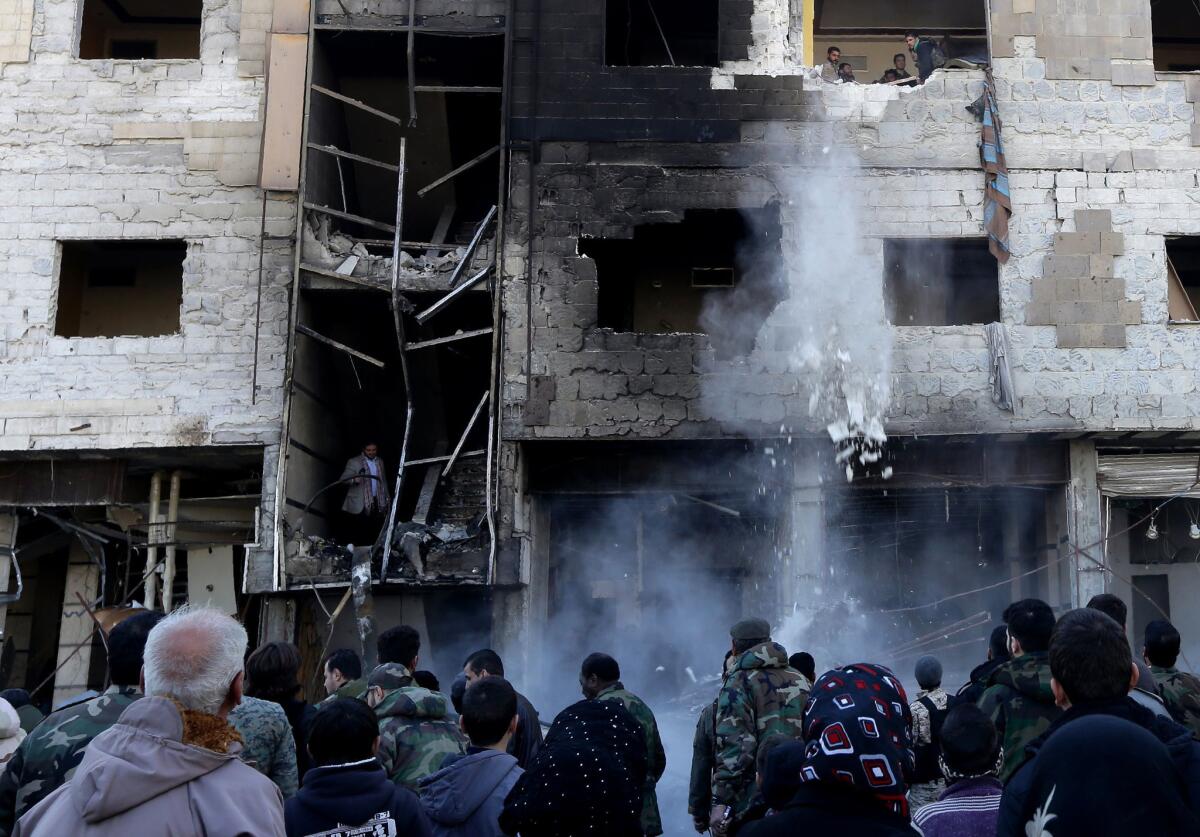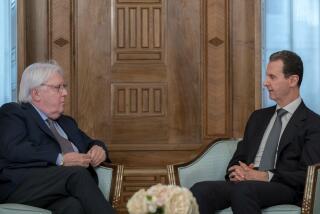Bombs kill more than 50 people in Syria; progress is elusive at Geneva peace talks

Syrian pro-government forces inspect the damage following suicide bombings near a Shiite shrine outside Damascus on Jan. 31
reporting from Geneva — Rival delegations in the Syrian peace talks were scheduled to meet Monday with the chief United Nations mediator, but the threat of an opposition walkout still hung over the fragile process -- the most concerted diplomatic effort to date aimed at ending the almost five-year Syrian conflict.
Even as U.S. Secretary of State John F. Kerry taped a video appeal urging both sides “to make the most of this moment,” a series of suicide bombings outside Damascus on Sunday again dramatized the punishing wave of destruction and carnage that has overtaken Syria.
Islamic State, the militant faction that emerged from the chaos of the Syrian conflict, took responsibility for Sunday’s attacks, which killed at least 50 and injured more than 100, Syrian state media reported.
Islamic State and the Al Qaeda-affiliated Nusra Front have been excluded from the Syrian peace talks here as terrorist organizations. But Sunday’s sectarian-fueled attacks near a Shiite Muslim shrine outside Damascus underscored the myriad obstacles to bringing peace to Syria.
Syrian government and opposition contingents were slated to hold their first working sessions Monday with Staffan de Mistura, the U.N. mediator, officials said, following several informal and preparatory meetings. Many viewed the development as a sign of hope that the tenuous process would move forward.
But the opposition negotiating team warned that its members were prepared to leave if Damascus does not grant several concessions upfront, including releasing prisoners and ending bombardment and sieges of rebel-held zones. The opposition group called its demands non-negotiable.
“If the [Syrian] regime insists on committing crimes, then there will be no justification for the delegation to remain in Geneva,” Riad Hijab, coordinator of the opposition High Negotiations Committee, warned in a Twitter message. “The presence of the delegation in Geneva is tied to the improvement of the humanitarian situation, and not in the framework of the negotiation process.”
The committee, an umbrella organization of Syrian armed groups and political dissidents formed last month in Saudi Arabia, is the main opposition group present in Geneva. Syria and its close ally, Russia, have complained that the committee includes representatives of several Islamist extremist factions.
The Syrian government said it was willing to discuss any issue raised by the U.N., but rejected “pre-conditions” being imposed before discussions have even begun.
“Those who talk about pre-conditions are amateurs in politics and it means that they are coming to the Geneva meetings to undermine [them],” the government’s chief representative, Bashar Jaafari, said at a news conference here, as each side aimed verbal salvos at the other.
Jaafari, Damascus’ ambassador to the United Nations, cited the opposition’s demands and its tardy arrival in Geneva as “proof of lack of seriousness and responsibility.”
Most of the opposition delegation did not arrive in Geneva from Saudi Arabia until Saturday, a day after the talks formally began. They came after frequent threats to boycott the talks, threats that still hang over the proceedings.
The opposition committee is backed by Saudi Arabia, which has funneled arms and other aid to groups fighting to topple the government of Syrian President Bashar Assad.
The official Syrian media derisively referred to the rival coalition here as the “Riyadh opposition,” a reference to its patronage by the oil-rich kingdom.
In his videotaped message, Kerry called the talks a “pivotal phase” in a coordinated international effort aimed at reaching a cease-fire in Syria, ensuring humanitarian access to needy and blockaded zones, and creating a political transition and U.N.-backed elections within 18 months.
“We call upon the parties in Geneva to take the first urgent steps and not to miss the chance this moment presents,” Kerry said.
Kerry pointedly blamed Assad’s government for much of Syria’s humanitarian tragedy, charging that Damascus had approved only 13 of 113 requests from the United Nations to deliver humanitarian aid since the beginning of 2015. Syrian officials routinely blame “terrorists” for regularly disrupting and hijacking humanitarian convoys and hoarding aid in rebel-held zones, while using civilians as human shields to protect against government bombardment.
The United States has been allied with Saudi Arabia in efforts to oust the Assad government in Damascus. But the Obama administration has backed off from earlier demands that Assad leave office at the start of a transition process. Two years ago, Syrian peace talks in Switzerland collapsed amid deep disagreements about Assad’s fate and the government’s insistence that fighting terrorism should be the priority.
The emergence of Islamic State, along with a refugee crisis that has sparked an outcry in Europe, has added urgency to resolving the Syrian crisis. Still, it remained unclear late Sunday if negotiations between the government and opposition activists would even take place.
On Sunday, De Mistura, the chief U.N. mediator, and his deputy made “courtesy” visits to government and opposition contingents at their respective hotels here, the U.N. said.
“We are here to ensure that Syria is free of dictatorship and free of terrorism,” Salim Muslet, an opposition committee spokesman, said Sunday in a statement. “We are here to make this a success no matter how long it takes.”
Jaafari, the government representative, also said that Damascus was committed to the process.
“As a government delegation, we have no preconditions to propose to anyone, and we don’t have taboos,” Jaafari said, according to the official Syrian media. “We are here to hold dialogue over any issue raised via De Mistura.”
The expected negotiations, if they begin, will not be face-to-face sessions but rather “proximity talks,” in which the two sides remain in separate rooms while U.N. officials shuttle between the various delegations.
Syria’s war, Kerry warned, “could easily engulf the region if left to spiral completely out of control.”
Already, the conflict has killed more than 200,000 people, left much of the country in ruins, spawned a new global generation of radicalized Muslim militants and created a refugee crisis that has reverberated in the region and in Europe. To date, there is no agreement on any kind of a cease-fire or let-up in hostilities across Syria.
Bulos is a special correspondent.
Twitter: @mcdneville
More to Read
Sign up for Essential California
The most important California stories and recommendations in your inbox every morning.
You may occasionally receive promotional content from the Los Angeles Times.










